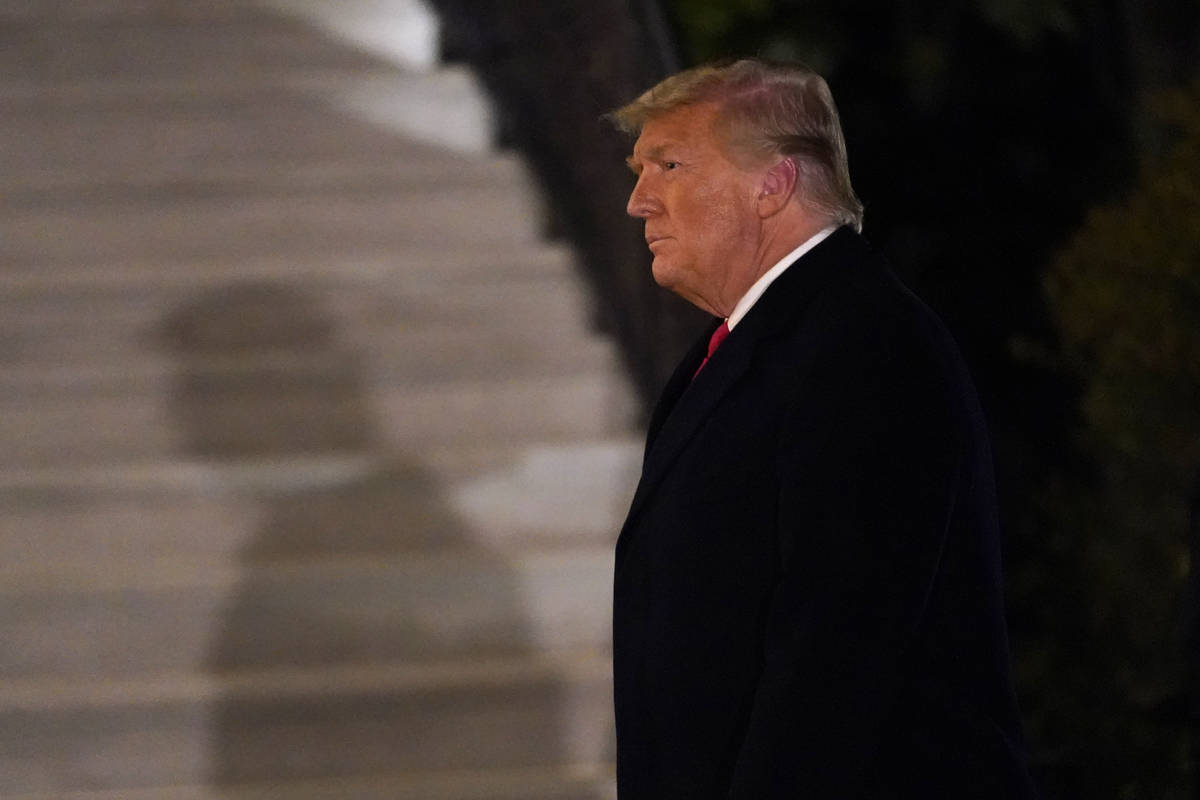Can President Trump pardon himself?
WASHINGTON — Can President Donald Trump actually pardon himself? It is a question that repeatedly has been asked since Trump lost on Nov. 3, and there’s only one way to find out.
“He can sign a pardon warrant and name himself,” University of St. Thomas law professor Mark Osler told the Review-Journal. Federal prosecutors likely would challenge the self-pardon, however, and then “the question would be answered for the first time by (U.S.) Supreme Court.”
On Aug. 5, 1974, one month before then-President Richard Nixon resigned in the midst of the Watergate scandal, the Department of Justice released a memorandum that opined, “Under the fundamental rule that no one may be a judge in his own case, the President cannot pardon himself.”
“It is inconceivable to me” former Pardon Attorney Margaret C. Love told the Review-Journal that the top court would uphold a self-pardon. “It has never happened in our country, in any of the states, or in England,” where 17th century kings granted pardons before the framers put the pardon power in the U.S. Constitution.
Harvard Law Professor Jack Goldsmith told the Washington Post, “It’s a genuinely uncertain question.” Scholars are divided and there has been no definitive ruling on the self-pardon question.
Article 2, Section 2 of the Constitution provides that the president “… shall have power to grant reprieves and pardons for offenses against the United States, except in cases of impeachment.”
There are only two limits on the power – it be applied only for federal crimes and cannot be used to avoid impeachment, Goldsmith said. “Other than that, it’s an unqualified power and it’s been interpreted very broadly by the Supreme Court,” he added.
‘Unusually dumb thing’
Former FBI director James Comey, whom Trump fired in May 2017, told “BBC Newsnight” that a self-pardon “that would be an unusually dumb thing even for him to do” – as Trump “would be inviting the sword of the Department of Justice.
Comey also offered that although he believes Trump belongs in jail, he thinks President-elect Joe Biden should consider pardoning Trump “as part of healing the country.”
Comey also said if Biden did pardon Trump, just as former President Gerald Ford pardoned Nixon for his role in Watergate, Trump “is not a genius, but he might figure out that if he accepts a pardon, that’s an admission of guilt. That’s what the Supreme Court said.”
Love noted the Supreme Court wrote in 1915 that accepting a pardon constitutes an admission of guilt, but, “It doesn’t mean it’s true.” Pardons have issued to individuals because they are believed to be innocent, for example.
Before Ford pardoned Nixon, Ford’s Gallup presidential approval rating was 71 percent. Within months of pardoning Nixon, Ford’s approval rating dropped to 37 percent.
Over time, public opinion softened in Ford’s favor. In 1986, Gallup found that 54 percent of Americans approved of Ford’s action.
Could Trump pardon leaders in the mob that stormed the Capitol on Jan. 6? Love sees an administrative headache in stipulating who benefits, but yes.
Or might the president grant clemency to individuals in exchange for some benefit, as some critics predicted? “It doesn’t affect the validity of the pardon, however, the president himself could be subject to prosecution,” if it can be proved the pardon was the result of a bribe, Love said.
Contact Debra J. Saunders at dsaunders@reviewjournal.com or 202-662-7391. Follow @DebraJSaunders on Twitter.























